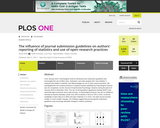
This resource is a video abstract of a research paper created by Research Square on behalf of its authors. It provides a synopsis that's easy to understand, and can be used to introduce the topics it covers to students, researchers, and the general public. The video's transcript is also provided in full, with a portion provided below for preview:
"Communication is key to business. If employees don’t communicate ideas or point out problems, organizations can struggle to improve efficiency and offer innovative products and services. That’s why leaders and organizations often encourage workers to voice their ideas and perspectives. If employees speak up and express their ideas and opinions, the thinking goes, then they’re not remaining silent about other problems or concerns. It turns out, that’s not the case. In an Academy of Management Journal paper, researchers analyzed multiple studies involving thousands of employees to understand the link between voice (how often employees volunteer constructive ideas or issues at work) and silence (the extent to which they intentionally withhold ideas or issues). The conclusion was that the two behaviors were virtually independent. The research found that voice and silence are driven by different psychological factors..."
The rest of the transcript, along with a link to the research itself, is available on the resource itself.
- Subject:
- Business and Communication
- Management
- Material Type:
- Diagram/Illustration
- Reading
- Provider:
- Research Square
- Provider Set:
- Video Bytes
- Date Added:
- 02/26/2021
